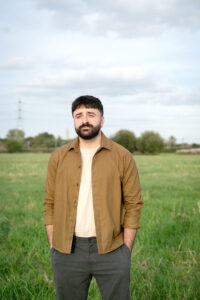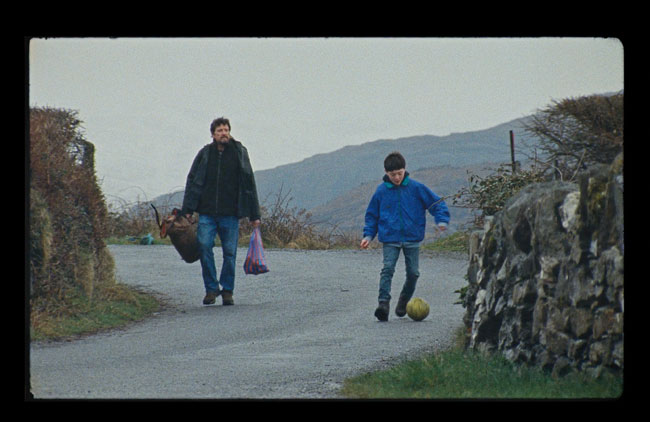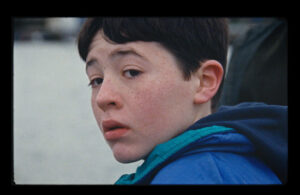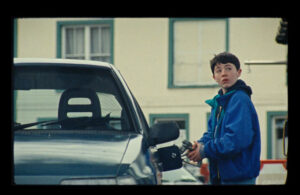Lochlainn McKenna told David Hennessy about his personal short film Two For The Road which stars Steve Wall and is about to screen at Irish Film Festival London.

Lochlainn McKenna’s Oscar-qualifying short film Two For The Road is the story of a father and son enjoying their weekend together despite the father, played by Steve Wall, letting the pub derail their time together.
The film is based on Lochlainn’s own childhood and his memoir of his turbulent weekends with his father. Set in 1990s Ireland, Two For the Road qualified to be considered for a 2024 Academy Award after winning Best Drama Short at the Oscar-qualifying Galway Film Fleadh.
Lochlainn McKenna, a multi-award winning writer and director from Cork City, has directed music videos for bands such as Westlife and Keane. Two For the Road won the RTÉ Francis McManus Short Story competition before it was made into a short film with its original title Guinness & Coke.
Lochlainn, who is based in London, told us about how the story came about when we chatted to him last year
“I guess it’s a funny thing to say, but I suppose I have to give thanks to the pandemic because, during the pandemic, I had the space to write, with nothing else to do. I’d always been good at writing and I suppose never really gave myself the opportunity to write.
My mum has been like massively supportive throughout the whole thing
“I’d had many sort of exciting and extravagant and tumultuous weekends with my dad over the years, and I always talked about them as stories. I just had this one story and I was like, ‘Look, I’ll write it down just for the craic’. And because of that [COVID], I had not just the space to write but also the space to redraft.
“So I redrafted loads.
“And because I redrafted, I guess I managed to make quite a good story. And, having written the story, I just took it into the Francis McManus short story competition. And then off the back of that, it got turned into a radio play. It got put on the Junior Cert curriculum as a comprehension and then, from there, we got funding to make it into a short.”
The film starts off with Steve Wall’s Hugh and Ewan Morris’ Oscar enjoying their father/ son weekend. They take a ferry to an island where the plan is to pitch a tent but things quickly descend as soon as the father sees a pub.
“My dad was very, very loving and very caring but also had his own demons, I guess.
“We had a lot of mad weekends together and that’s kind of the genesis not just for the film, but for me probably becoming a filmmaker in the first place, I suppose having that sort of adventurous spirit and the want and nous to sort of roll the dice and to actually do this in the first place.”

Things go downhill quickly when Hugh asks Oscar, ‘Do you think that pub has pool?’ He’s supposed to be, and he is I guess, charming. He’s supposed to be charming, affectionate and loving. It’s just the nature of having a child in that environment is not appropriate, so it was really important to me to tell the film through the lens of a child.
“When you see characters that are drunk, usually the camera’s handheld and shaky and loose and focus is in and out. But because it’s from Oscar’s perspective, it’s all static. It’s his view and everything is very, very clear and very coherent. I think that’s important.”
Speaking of Oscar, how pleased were you with the great young actor Ewan Morris who plays a young you?
“Very much so. And I think it’s a funny one because I suppose I never in my life thought I was gonna cast myself or my father or my mother for that matter. It would be remiss of me to say it wasn’t challenging. Well, I found the role of Oscar, or me, very, very easy really, in the sense that I didn’t care about the look, it was never important to me if he was black, or Hispanic or anything really, as long as he and the father had a likeness.
“So the plan was always to find a good child and then whoever the child was, we were going to cast someone to look like that. So if it had been a ginger child, we probably would have looked for like a ginger actor of the right age. But in Ewan’s case, he was the fifth kid in the door and he just blew me away. He was just such a wonderful child. He’d never acted on screen before. It was his first in-person audition.

“He came into me and the first thing he said is, ‘I read the story and I just wanted to tell you, I really love Mint Crisp bars too’. I was like, ‘Brilliant, we’re off to a winner’.
“Eva-Jane Gaffney, who did the child casting, should get a lot of credit really. She and I were just looking at each other trying not to smile the whole way through the audition, it was just brilliant. I did this improv with him during the casting, which is based off an experience I’ve had with my dad, whereby he once pretended that he’d won the lotto. I hopped in the car at the weekend, and he was like, ‘Lochy, I’ve won the lotto but lost the ticket’. I was like, ‘No way’.
“And then we spent the whole weekend looking for this ticket that didn’t exist which is amazing, an amazing thing to do for a child, to create this adventure. I did that improv with Ewan and he was just like, ‘What? No, but Dad maybe it was in the pub, when you took your money out of your wallet, maybe it slipped out because you were buying loads of pints’. He kept referencing the story, it was brilliant. But he’s just a lovely, lovely child.
“He’s wonderfully astute. He’s very spongy, but also offers a lot. When we were on set, he was constantly contributing, ‘What if I was to do this, or if I came from there?’ He just got it and I think loved being on set, loved the vibe of it all, and it’s just been really humbling actually, just to see how much he’s taken to it.
“It’s been probably the most positive experience I’ve had throughout the whole thing really. He’s just wonderful.”
My dad was very, very loving and very caring but also had his own demons, I guess.
Steve Wall, although now well known as an actor with credits like Moone Boy, The English and The Witcher to his name, first came to prominence as the Stunning’s frontman. I have to say I was overwhelmed really with how well Steve took to the part because it was really important to me that we kind of found a blend between it being Steve’s character and my dad. Finding the nuances and the character details, we just spoke so much.
“And one thing, his [my father’s] accent is kind of varied from moving around. Put it that way, he’s got a very unusual accent and it was really important to Steve and I that we found an accent that you couldn’t place. So because he’s a musician, he was able to work on the timbre of the voice based on my explanation and we kind of managed to find an unusual sort of accent that you can’t place, which I love.
“But Steve just did a tremendous job, I think, of inhabiting everything that I was able to explain and also building his own sort of character based on his own sort of experiences. And yeah, I just thought he made a really amazing character. And also, he did such a brilliant job of kind of nurturing Ewan on set and having to be that sort of fatherly character.
“They were obviously together like glue for most of the shoot, and nurturing him and explaining everything to him and just being really, really kind and playful and present. All these things that are so important when working with a child, especially a child that’s never been on set before.”
The way you talk about finding Ewan reminds me of how Colm Bairéad spoke about finding Catherine Clinch for The Quiet Girl. It seems like there’s a really exciting crop of very young actors in Ireland…
“100% and I’m really glad you mention that because I must say, we saw somewhere between 100 and 200 kids, and I was blown away, so many amazing young kids. It was hard, I guess, because in one sense, I always knew it was Ewan but we did also do our due diligence to make sure that we were getting it right.
“Actually in the scene in the bar, some of the bar kids that are running around are kids that we had shortlisted for the main role as well who also did brilliant auditions. So we brought them in as well, just to try and give them some experience of of being on set. So much talent in Ireland, I think.”
And Irish cinema is certainly going from strength to strength. We just mentioned The Quiet Girl and you follow An Irish Goodbye that won the Oscar for Best Short last year with similar themes of family.
“I think there’s two things. I think Irish cinema is having a moment in a really positive way. I do also think that these sort of stories are having a moment as well. If you look at Aftersun, Scrapper, I do think that those kind of films are just on people’s minds, or in people’s hearts.
“I’m not sure where that’s coming from but I do think that hopefully we can have a combination of riding the Irish cinema wave and that wave and they’ll come together. Fair play to Ross and Tom for An Irish Goodbye. Seeing that becomes this kind of inspiration, ‘It is actually possible’. I think that is your responsibility as a filmmaker as well, to try and inspire younger generations and to try and nurture new talent.”
What was the story with that scene where Oscar is going to the toilet and that old man comes in and looks at him for way too long if you ask me…
“How did you interpret it out of interest?”
Well, it being the toilet made me feel a bit weird about it..
“I think that’s exactly it. What was important to me about that is that it’s sort of where the film shifts. Oscar is already bored at this point, he wants to go home. He goes to the bathroom and he has an experience, which I would say, walks the grey line. As pubs get later, as the nights drag on, an environment like that is less and less safe for a child.
“That’s not to say that the man was ever going to do anything or that he was even in any way uncouth or anything. It’s just that he could have been and I think that’s why it’s important to me that it’s up to the viewer to kind of watch and be like, ‘Is that alright? Actually, I don’t know. Maybe that child shouldn’t be talking to that man in the bathroom’.
“Maybe he’s just a friendly old fella. I don’t know. I just wanted to make sure that the audience just goes, ‘Urgh, I don’t know if feel great about him being in there’. And then next thing he’s out and asking dad to go home again. And it just gets progressively worse from there.”
At the end of the film Oscar returns to his mother and gives her little detail about what transpired on their weekend. I guess the character is between his parents in a way, isn’t he? He can’t tell on his dad for fear of not seeing him anymore..
“It’s important from the film’s perspective that you see he’s coming home to his mother because it’s like the antidote to the weekend. It kind of alleviates the badness that’s come before, and shows us that he does have a healthy home to go home to and a loving mother, not that his father isn’t loving but there’s a non- chaotic existence there as well.
“I’ve always used the same term since I was little, I call it Sunday syndrome. Sunday syndrome is what I’d have when I come home from the weekends and though I’d be at home, I’d still feel like I kind of wasn’t at home, this sort of like loose lostness being described in the story like a ship that can’t come to port.
“My mam has been like massively supportive throughout the whole thing. She said to me, ‘How are you going to capture Sunday syndrome in the film?’ I think it comes across really strongly to be honest.
“I think the scene where he’s carrying him in and then you see Oscar sort of just sitting in his bedroom listless, not knowing where to go, can’t go to bed. He’s still on the buzz and the high of the weekend.”
What has it been like to screen this personal film of your childhood?
“We had a screening in Galway in July. And it’s funny, I’d seen the film maybe 100 plus times at that stage. The first frame came up, and I just sank. My reaction was like, ‘Just get it off the f**king screen’. I was in the middle of the crowd and I was just like, hyperventilating, was crying and I was like, ‘Oh my God’.
“It’s just different to watch it knowing my family were there and friends. It’s just a very, very, very mad experience, an experience I don’t think I’ll ever have again because I kind of don’t imagine I’ll make anything quite as personal or directly personal as this – Well, we’ll see.
“It was just a very, very, very, very heartfelt reaction. It was a deep response within me, I guess. It was such a personal story, but I wanted to make sure that everyone was kind of on the journey with me. With that in mind, all of the HODs that I got and everyone really, but particularly them I think, really invested in the story. [Production Designer] Ciara O’ Donovan said to me, ‘It’s just a special project. It’s special for us, it’s special for you’.
“The level of care that everyone had for the film made the film kind of what it is today. It felt like a special shoot and that kind of made it a special film.”
Two For the Road qualified to be considered for a 2024 Academy Award after winning Best Drama Short at the Oscar-qualifying Galway Film Fleadh.
“We just feel very, very privileged. It’s been a whirlwind, I feel humbled by the whole thing. It was never about that, shouldn’t be about that. You take it with a pinch of salt, I think. It’s all kind of pie in the sky in one sense. But then also you need to take it seriously and kind of do your best to try and get on the shortlist.”
Lochlainn is currently working on developing that story into a book and, furthermore, a feature film.
 “We’ll see how much my heart can take. I am writing. I have loads of memories. My plan is basically to write a book. In my mind, it’ll be ten stories long, across ten separate weekends. That’ll be the basis for the feature. I’m not exactly sure of the guise or the structure or how it will fall. It’s exciting. It’s hard. It’d be silly for me to say it had not been hard to even get to this point of writing it.
“We’ll see how much my heart can take. I am writing. I have loads of memories. My plan is basically to write a book. In my mind, it’ll be ten stories long, across ten separate weekends. That’ll be the basis for the feature. I’m not exactly sure of the guise or the structure or how it will fall. It’s exciting. It’s hard. It’d be silly for me to say it had not been hard to even get to this point of writing it.
“But I think what I’ve learned even from doing the short is that – I’m not saying this is true of all the work but certainly in this case, or in my case – personal work makes for good work.
“The reaction of people when we came out of the cinema in Galway really kind of showed me that it was worth doing, that the film was worth making. There were people I’d never met before just, like, in floods of tears. They were like, ‘It just meant so much to me’. They really connected with it, I think it’s been cathartic for people and I maybe wasn’t expecting that. I always knew it would be kind of my own catharsis but not cathartic for others as well.
“And now that I’ve kind of seen that, it’s opened up kind of a whole other perspective and world for me where I’m like, ‘Okay, it probably is something worth making in a longer form, whatever that may be’.
“It’ll take a bit of time but yeah, it’s exciting.”
Two For the Road screens 9pm on Thursday 14 November at VUE Piccadilly with the film Prospect House as part of Irish Film Festival London (13- 17 November).
For more information and to book, click here.


